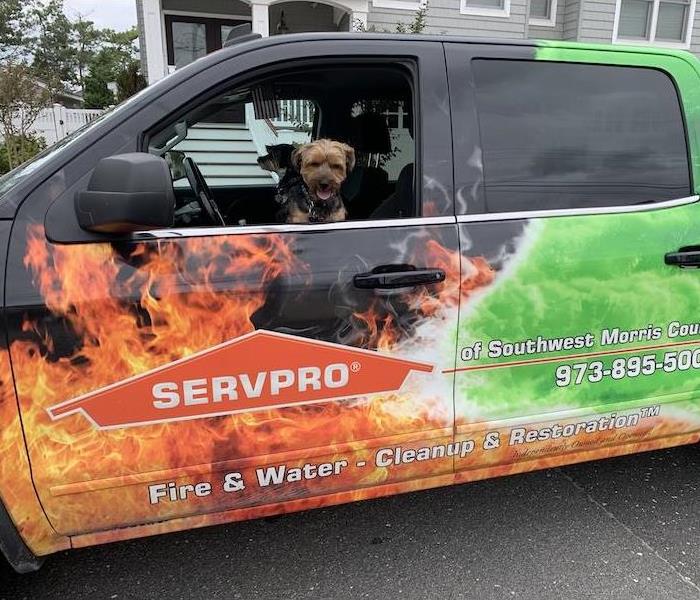When Can Cleanup Begin After a Flood?
10/29/2020 (Permalink)
 What is better than a technician with 2 legs? One with 4! Let SERVPRO’s team help with your flood damage.
What is better than a technician with 2 legs? One with 4! Let SERVPRO’s team help with your flood damage.
When your Randolph home falls victim to flooding, cleaning and restoration practices should begin as soon as possible.
Knowing what to do following a flood is not always clear after your Randolph home suffers damages. You prioritize the house's specific recovery needs, but DIY cleaning and recovery are not always possible or feasible for widespread flood loss effects. Many look to the experience of professional flood restoration companies like our SERVPRO team to help in these situations, as we have industry-leading equipment, continual training and education, and communication skills to decipher your priorities in restoration.
Cleaning and flood removal for Randolph homes must happen as soon as possible, meaning that you should not hesitate to contact both your insurance company and restoration professionals like our technicians. As a comprehensive solution for restoring natural disaster damage to your residence, we have both experienced technicians accredited from the Institute of Inspection, Cleaning and Restoration Certification (IICRC) and licensed general contractors to prevent specific conditions from worsening, including:
- Structural Damage: Through practices like controlled demolition and inspections, we can determine the extent of present structural concerns and prevent these conditions from worsening and leading to collapses.
- Contaminants: Contamination is always a concern with natural flooding, as the presence of bacterial and viral pathogens cannot be ruled out. The fewer materials and contents that become exposed to moving floodwater, the less that must get discarded and later replaced.
- Ruined Contents: Your personal belongings left in harm's way can become irreparably harmed, or due to contamination exposure, beyond restoration.
- Odors: Standing water and saturated materials, combined with the various substances, chemicals, and organic matter brought in with flooding, can create a pungent odor that requires neutralization.
Can Extraction Start Right Away?
Extraction should begin as soon as possible because standing water continues to be a severe threat to the property, even when contaminants are not a concern. Because natural flooding also embodies the risks of bacteria and viral pathogens, exposure to materials often means discarding these structural elements. Preventing saturation beyond surface materials becomes a critical effort that requires multiple extraction tools based on the severity of the situation, its location, and what solids/debris might be present in the standing water. Once surface water is mostly removed, muck-out cleaning can begin.
What Is Muck Out?
After the immediate effects of natural flooding, cleaning up often means encountering a considerable volume of organic matter and debris on the floors, walls, and other exposed surfaces. Muck-out is one of the preliminary cleaning actions taken to remove this buildup while simultaneously reducing the concentrations of bacteria, contaminants, and odors. Common substances and debris include:
- Dirt
- Mud
- Debris
- Silt
- Foliage
Can Some Surfaces Get Cleaned Instead of Removed?
Contamination is a considerable concern when natural flooding occurs. Choosing what materials can stay installed and which must get discarded is a very concise need. Often, porous materials that become directly exposed to standing floodwater or migrating loss effects must get discarded and later replaced. With the appropriate management of the pooling water and the efficient removal of surface materials like drywall and certain flooring types, wood framing and subflooring often only requires cleaning and antimicrobial treatments. Particular flooring and wall types that are low-porosity can also typically get cleaned, including:
- Concrete
- Tile
- Brick/Block
If Demolition is Required, When Does This Occur?
Because we have a roster of qualified and licensed general contractors, we can offer controlled demolition solutions as the needs get identified. During the job scoping phase, our project manager can indicate where controlled demolition might be necessary and potential problem areas that could worsen without attention. Early mitigation stages provide the appropriate timeline to safely remove these impacted materials and contents before further deterioration.
Can Odors Get Removed?
Neutralizing and removing odors after a flood disaster requires several tools and strategies. We can begin with reducing the severity of these conditions through products like deodorizing granules and odor counteractant beads that absorb these odors and replace them with a pleasant scent. Deodorization occurs as one of the final cleaning steps for a property and often involves versatile tools like thermal foggers and ozone machines.
Cleaning and removing the effects of flooding in your home is not a situation that homeowners are often equipped to handle independently. With the experience of our professionals and the current inventory of leading tools for extraction and cleaning at our disposal, SERVPRO of Southwest Morris County can help you to make it "Like it never even happened." Give us a call today at (973) 895-5000.






 24/7 Emergency Service
24/7 Emergency Service